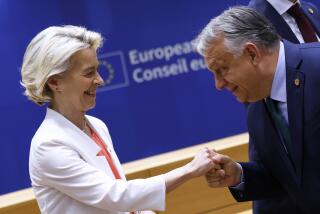Kadar Urges Hungary Reforms, Gives No Hint of Stepping Down
- Share via
BUDAPEST, Hungary — Communist Party leader Janos Kadar called Friday for political reforms and a rejuvenation of Hungary’s leadership in a 50-minute speech that gave no hint if he was about to relinquish power after more than 31 years.
But he said the party would not give way to “aspirations violating socialist order” and must prevent people from being influenced by “sectarian, dogmatic and revisionist views.”
One Western diplomat summed up Kadar’s arguments as: “We want more democracy, but will stamp it out.”
“Our system of political institutions has not matched up to the task,” Kadar said in an opening speech to nearly 1,000 delegates attending Hungary’s first special party conference since 1957. “Confidence in party leaders has deteriorated.”
Senior Hungarian officials and party members have said they believe Kadar, who will be 76 next week, will resign as general secretary at Sunday’s closed-door session on the final day of the conference.
Criticism of Leadership
Senior official sources said Thursday they believed Kadar had finally agreed to bow out as general secretary after widespread criticism of his leadership during nationwide party discussions before the conference.
One rumor holds that he announced his decision Tuesday at a stormy meeting of the ruling Politburo which agreed that energetic Premier Karoly Grosz, 57, a contemporary of Soviet leader Mikhail S. Gorbachev, would take over as leader of the confused and dispirited party.
But in his speech Friday, Kadar gave no sign of any immediate plans to step down.
He spoke of the need for “comprehensive reform of our political institutions” in an address widely viewed as old-fashioned.
A Hungarian official said: “It was the worst speech. He is an old man. He cannot change.” He said the speech was irrelevant since the party had already decided Kadar must go.
Installed in 1956
Kadar has led Hungary since being installed in November, 1956, by Soviet troops putting down an anti-Soviet uprising.
After winning genuine popularity in the 1960s and 1970s through reforms making Hungary the most open and liberal East Bloc country, Kadar is now regarded as a spent force who blocked further necessary reforms in the 1980s.
Hungary is struggling with a huge debt, a severe current account deficit and falling living standards. Party membership fell by 46,000 to fewer than 830,000 last year.
Most sources believe that Kadar--who is seen as blocking new reforms considered necessary by the younger generation--will be removed from power and given a new honorary post such as party president.
Even if Kadar remains in place, his authority to obstruct reforms will be diminished by the likely removal of several older members from the Politburo.
More to Read
Sign up for Essential California
The most important California stories and recommendations in your inbox every morning.
You may occasionally receive promotional content from the Los Angeles Times.












